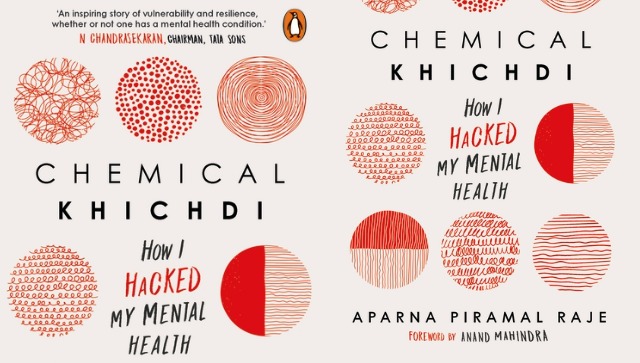“I have lived with bipolarity – classified as a serious mental illness – for over two decades,” writes Aparna Piramal Raje in her new book Chemical Khichdi: How I Hacked My Mental Health (2022). Published by Ebury Press, an imprint of Penguin Random House India, it is a cross between a mental health memoir and a self-help manual. The tone is candid but not self-deprecatory. She speaks of herself gently and kindly, modelling what caregivers, friends and family, employers, colleagues, and medical professionals must do to be genuine allies. The author writes, “The word ‘ally’ is commonly used to describe friendly nations who come together in wartime to protect one another. It is particularly appropriate for someone with a mental health condition such as mine, which often feels like a psychological and physiological civil war.” She devotes several pages of this book to show how her parents, sister, husband, child, friends, mentors and networks have sheltered her “during wartime” and nourished her “during peacetime”. Over time, they had to learn how to be there for her. Language is important as it shapes reality, evokes feelings, and determines perception. The author writes, “There is a debate about whether one should say ‘I am bipolar’ or ‘I have bipolar’ – the latter, to my mind, seems grammatically incorrect.” She prefers to say “I am bipolar” or “I live with bipolarity”. Instead of labelling it “a disorder” – which sounds like “a malfunction of some sort” – she likes to call it “a mental health condition” that she has. The book has a three-part structure, with the common thread of lived experience running through it. The first part focuses on the author’s experience of the condition from 2000 to 2012, from 2013 to 2018, and from 2018 to the present. The second part looks at how the author takes care of herself. It begins with “medical therapies” and goes on to everything else that she finds therapeutic, including love, empathy, work, exercise, nutrition, spiritual practice. The third part is filled with many resources, reflections, and recommendations. What is the difference between mania and hypomania? How do chemical reactions in the brain trigger shifts in mood and energy levels? What does a manic episode look and feel like? How does it affect personal well-being, relationships with loved ones, and productivity at work? Is there a sequential path to full recovery, or is the journey more about management rather than cure? How does the experience of bipolarity vary from one person to another? If these questions interest you, read the book. It tries to minimise the use of technical jargon. The author aims to be “hopeful and helpful”, which is why she chooses to offer “vulnerability in all its misshapen glory”. She wants her words to have far-reaching impact, while also acknowledging that she has not faced the kind of financial challenges that many others have to because she belongs to “an affluent business family” and has been educated at University of Oxford and Harvard Business School. This “radical transparency” is noteworthy because it recognizes that care comes at a cost, and that “privilege helps to insulate against stigma”. The author writes about break-ups, coming to terms with her parents’ separation, delusions, suicidal ideation, and times when she had to be “rescued” by family members. It must have taken a lot of courage to share such intimate and personal details – especially the section where she writes about being held “mentally hostage” by “scenes of sexual trauma” playing out in her mind. “I have never been sexually abused myself”, she writes, clarifying that she was “imagining that these awful acts were actually happening” to people that she knew. Throughout the book, you will encounter poems written by the author, extracts from her journals, and interviews with “those in my ecosystem, as well as outside my orbit.” With her experience as a journalist, she knows the value of bringing in diverse perspectives to enrich the reader’s understanding of an issue. There is another reason for honouring these voices – the realization that being an ally is not easy. People who provide support on a daily basis are also in need of care. They need solid, dependable support systems of their own to lean on. The author opens up about the strain that her mental health condition put on her marriage, and how she and her husband have both had to learn how to navigate the challenges together. She writes, “For me, ongoing vigilance by my spouse can feel detrimental to the quality of our relationship. No one wants to be viewed as a patient. Thankfully, Amit has stopped asking me whether I take my meds but he still monitors the duration and quality of my sleep.” The book would also be tremendously useful to employers who are trying to figure out how to be “progressive” and “empathetic” in their approach towards mental health – whether it is in terms of providing access to psychotherapists, meditation teachers and yoga instructors, or paid leave, flexible work arrangements, health insurance, and other benefits to convey that care is not limited to lip service – that they are willing to put money where their mouth is. Chintan Girish Modi is a journalist, commentator, and book reviewer. _Read all the **Latest News** **,** **Trending News** **,** **Cricket News** **,** **Bollywood News** **,** **India News** and **Entertainment News** here. Follow us on Facebook**,** Twitter and Instagram**.**_
Chemical Khichdi: How I Hacked My Mental Health would be tremendously useful to employers who are trying to figure out how to be “progressive” and “empathetic” in their approach towards mental health.
Advertisement
End of Article


)
)
)
)
)
)
)
)
)



